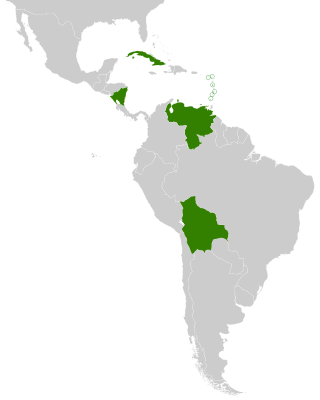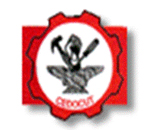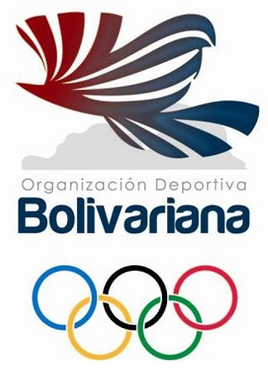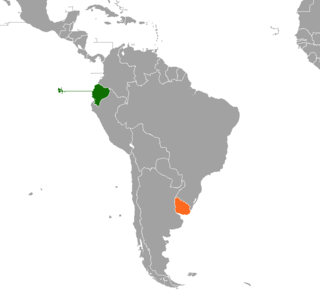
The politics of Ecuador are multi-party. The central government polity is a quadrennially elected presidential, unicameral representative democracy. The President of Ecuador is head of state and head of the army on a multi-party system, and leads a cabinet with further executive power. Legislative power is not limited to the National Assembly, as it may to a lesser degree be exercised by the executive which consists of the President convening an appointed executive cabinet. Subsequent acts of the National Assembly are supreme over Executive Orders where sufficient votes have been cast by the legislators. The judiciary is independent of the executive and the legislature. Ecuador is also considered a constitutional republic.
A trade union or labor union, often simply referred to as a union, is an organisation of workers intent on "maintaining or improving the conditions of their employment", such as attaining better wages and benefits, improving working conditions, improving safety standards, establishing complaint procedures, developing rules governing status of employees and protecting and increasing the bargaining power of workers.

The Organization of American States is an international organization founded on April 30, 1948 to promote cooperation among its member states within the Americas. Headquartered in Washington, D.C., OAS is a "multilateral regional body focused on human rights, electoral oversight, social and economic development, and security in the Western Hemisphere," according to the Council on Foreign Relations. As of June 2023, 35 states in the Americas are OAS members. Since the 1990s, the organization has focused on election monitoring. Luis Almagro was inaugurated as OAS secretary general in 2015.

A congress is a formal meeting of the representatives of different countries, constituent states, organizations, trade unions, political parties, or other groups. The term originated in Late Middle English to denote an encounter during battle, from the Latin congressus.

A credit union is a member-owned nonprofit cooperative financial institution.

The Andean Community is a free trade area with the objective of creating a customs union comprising the South American countries of Bolivia, Colombia, Ecuador, and Peru. The trade bloc was called the Andean Pact until 1996 and came into existence when the Cartagena Agreement was signed in 1969. Its headquarters are in Lima, Peru.
A national trade union center is a federation or confederation of trade unions in a country. Nearly every country in the world has a national trade union center, and many have more than one. In some regions, such as the Nordic countries, different centers exist on a sectoral basis, for example, for blue collar workers and professionals.

The Democratic People's Movement was the electoral wing of the Marxist-Leninist Communist Party of Ecuador and a political party in Ecuador since 1978.

ALBA or ALBA–TCP, formally the Bolivarian Alliance for the Peoples of Our America or the Bolivarian Alliance for the Peoples of Our America – Peoples' Trade Treaty, is an intergovernmental organization based on the idea of political and economic integration of Latin American and Caribbean countries.

The Confederación Ecuatoriana de Organizaciones Clasistas Unitarias de Trabajadores (CEDOCUT) is a trade union centre in Ecuador. It has a membership of over 86,000. As of 2006, CEDOCUT organized 92 trade unions, 1.71% of the total number of unions in the country. Its primary base are unions in small and medium-sized companies, farmers and neighbourhood associations.

The Confederación de Trabajadores del Ecuador is a trade union centre in Ecuador. CTE was founded on July 9, 1944, on the initiative of the Communist Party of Ecuador. The organization was awarded legal recognition on March 3, 1945. CTE is affiliated with the World Federation of Trade Unions.
Disunited and poorly organized for most of its history, trade unions in Ecuador developed only slowly and had only a marginal political impact. Precise figures on unionization in the late 1980s were practically nonexistent, even within the unions themselves. The organized labor movement in Ecuador was divided into four confederations and a number of independent federations. At the local level, labor organizations also took the form of artisan guilds, cooperatives, and neighborhood associations. In addition to representing only a minority of the workers in all sectors of employment, the labor movement traditionally was weakened by rivalry and government repression. Nevertheless, it had influence disproportionate to its numbers as a result of the concentration of trade unions in urban areas, mainly Quito and Guayaquil, its organizational power, and the political impact of strikes and demonstrations on governments that did not enjoy strong support.
Robert Jackson Alexander was an American political activist, writer, and academic who spent most of his professional career at Rutgers University. He is best remembered for his pioneering studies on the trade union movement in Latin America and dissident communist political parties, including ground-breaking monographs on the International Communist Right Opposition, Maoism, and the international Trotskyist movement.
Anarchism in Ecuador appeared at the end of the 19th century. At the beginning of the 20th century it started to gain influence in sectors of organized workers and intellectuals.
The Unión General del Trabajadores de Ecuador is a trade union centre in Ecuador. UGTE emerged after a split in CTE. The founding congress of UGTE was held November 20-21, 1982. The founding leader of UGTE was Patricio Aldáz. The organization was awarded legal recognition on September 29, 1994. UGTE is politically linked to the Marxist-Leninist Communist Party of Ecuador and the Democratic People's Movement (MPD), and forms part of the Popular Front. UGTE is not affiliated to any international trade union organization.
The integration of Latin America has a history going back to Spanish American and Brazilian independence, when there was discussion of creating a regional state or confederation of Latin American nations to protect the area's newly won autonomy. After several projects failed, the issue was not taken up again until the late 19th century, but now centered on the issue of international trade and with a sense of pan-Americanism, owing to the United States of America taking a leading role in the project. The idea of granting these organizations a primarily political purpose did not become prominent again until the post-World War II period, which saw both the start of the Cold War and a climate of international cooperation that led to the creation of institutions such as the United Nations. It would not be until the mid-20th century that uniquely Latin American organizations were created.

Organización Deportiva Bolivariana is a sports organization based in South America. It organizes the Bolivarian Games.

Ecuador–Uruguay relations are foreign relations between Ecuador and Uruguay. Ecuador has an embassy in Montevideo. Uruguay has an embassy in Quito and a consulate in Guayaquil.

The World Federation of Democratic Youth (WFDY) is an international youth organization, and has historically characterized itself as left-wing and anti-imperialist. WFDY was founded in London in 1945 as a broad international youth movement, organized in the context of the end of World War II with the aim of uniting youth from the Allies behind an anti-fascist platform that was broadly pro-peace, anti-nuclear war, expressing friendship between youth of the capitalist and socialist nations. The WFDY Headquarters are in Budapest, Hungary. The main event of WFDY is the World Festival of Youth and Students. The last festival was held in Sochi, Russia, in October 2017. It was one of the first organizations granted general consultative status with the United Nations Economic and Social Council.













